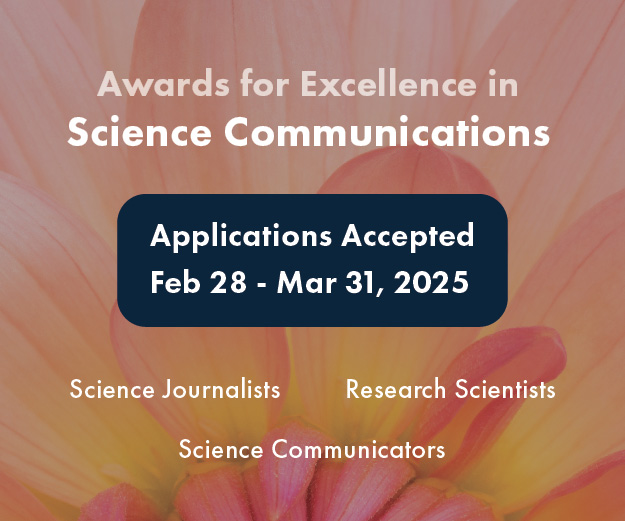Dear Prospective Student,
Thanks very much for your interest in our graduate program in science writing. You're off to a good start by sending a professional message with some well-composed details about your background and your desire to enter our field. We'll talk soon over the phone, and I welcome you to visit us here in the redwoods. In the meantime, you've asked what I look for in our applicants — the signs that you might be a good fit for us, and vice versa. I'm happy to oblige.
First, it's terrific that you've tried science writing on your own. I don't care as much about the venue as I do about your initiative. Too many students write to us with idealized visions of working in this profession. They're attracted to the concept because they're tired of research (or teaching, or working at job X), and they've always liked to write. But they haven't actually done it, and that's worrisome. These days, you can easily write about science for your college paper, your university news office, a local weekly that craves fresh new voices, a science advocacy website, or a blog you've created on a subject you care about. You've sought out a writing internship; that's great. Others haven't even dipped their toes into any of these waters, and I have to wonder, why not?
Second, I'm impressed that you've taken the time to compare and contrast your options among the fine graduate programs. The courses, internships, online writing, multimedia training, and major projects all differ, as do the backgrounds of the students. Find out who'll teach you and what they've done in their careers. These instructors love what they do, and they become your mentors. Look for writers with whom you think you can forge a connection. Often, those ties will last throughout your career.
You've done much of that research, and that tells me you've got the gumption to be a reporter. We want to see a certain fearlessness to ask questions, to dig. We're seeking young journalists, not desk jockeys.
Applicants often ask whether their previous degrees matter. If they have a bachelor's in science, should they continue toward a master's? Or a Ph.D.? Sure, but only if you love it and want to see where it might lead you. If you're still passionate about research, your writing down the road will be all the richer for it.
Frankly, there are successful science writers of all stripes, including those from the liberal arts. Your academic pedigree is a factor, but we're not looking for a neatly completed curriculum with perfect 4.0s at every step. Rather, program directors care far more about the interesting things you've done. We want each cohort of students to be as dynamic as possible, with varied perspectives on the world. If you've edited a publication, organized community debates, worked in the field with animals, or served in the Peace Corps, great. If you've gone places and challenged yourself, you'll be a better journalist.
Your letters of reference are important, too. Try to recruit recommenders who can go beyond your coursework or your time in the lab. If you've taught, ask someone to write about that. It's relevant for communicating science to the public. If you've written for publication, ask your editor to describe how your first drafts are perfectly constructed, delightfully stylish, and error-free. (Sorry, a director can dream.)
Then there are those admissions essays. Spend time on them. Be original with your approach and your voice. Tell me a story. It is remarkable how many essays I receive that begin with some variant of this: "I'm applying to the UCSC science writing program because I want to be a professional science writer." After I wake up from my short nap, I move on to the next file.
Gauging whether an applicant has an innate gift for writing, an ear for the language, is the dark art in this whole process. I really can't put it into words. But when I come across such essays, it's as if the screen glows. I can't stop smiling.
Over the years, I've also noticed a few things that I've mentally filed under "kids these days." For instance, more than one applicant has written an essay stating how much they want to study at [competing program's name here]. Oops, they forgot to switch every institution name to UC Santa Cruz! That's a rather big oops.
Missing an appointment is even worse. When I set up a phone interview, I ask the candidate to call me. Most of them hit that time on the button. If I get a panicked e-mail a day later, that tells me something about the student's organizational skills.
Please use the proper salutation in your messages. Starting an e-mail with "Hi," followed by no name, just doesn't cut it. I do chuckle a bit when students write "Dear Dr. Irion," because that degree and I missed each other by quite a few years. But it's a far sight better than "Hi." And, review each message for typos before you send it. You're contacting a journalism program, and you're applying to enter one of the most detail-oriented professions around.
You'd think no one would write to a grad program director in all lower case, or use a few texting abbreviations, or toss in an emoticon, or emphasize excitement with exclamation points. But yes, some students do. omg, one glorious message featured all four!! I have no idea where that applicant is now.
Speaking of e-mail etiquette, please do respond — especially when I take the time to explain how you might make yourself a stronger candidate in the next year or two. We've had many students over the years who took this constructive advice, explored writing on their own for a while, and then returned with a new perspective and some great clips. They didn't give up, and they kept in touch. When applicants just vanish after getting a long, personalized letter of denial, they slam the door on their future chances here.
I realize that you probably don't like taking standardized exams to get into a writing program. And yes, the grading of that analytical writing GRE is mysterious to me, too. However, we need some initial screen, some quantitative measure in this otherwise very qualitative review. There's a correlation, albeit a broad one, between certain scores and the writing we see in our coursework and beyond. Sending a 4,000-word anti-GRE manifesto, as one applicant did a couple of years ago, probably won't help your cause.
Finally, keep in mind that each time we interact — by e-mail, by phone, or in person — you are making an impression. So much of this business hinges upon the first impressions you make as a reporter with a source, as a freelance contributor to a new editor, and as a professional colleague with fellow writers. Science writers love their networks, and we help each other. If you're prompt, engaged, informed, and fun in good measure, we'll remember all of those things.
Here's the bottom line: If I can't wait to work with you and make this new career possible, then you've filed a darned good application.
With best regards,
Robert Irion
Robert Irion is co-chair of the NASW education committee and director of the Science Communication Program at the University of California, Santa Cruz. Reach him at irion@nasw.org.



